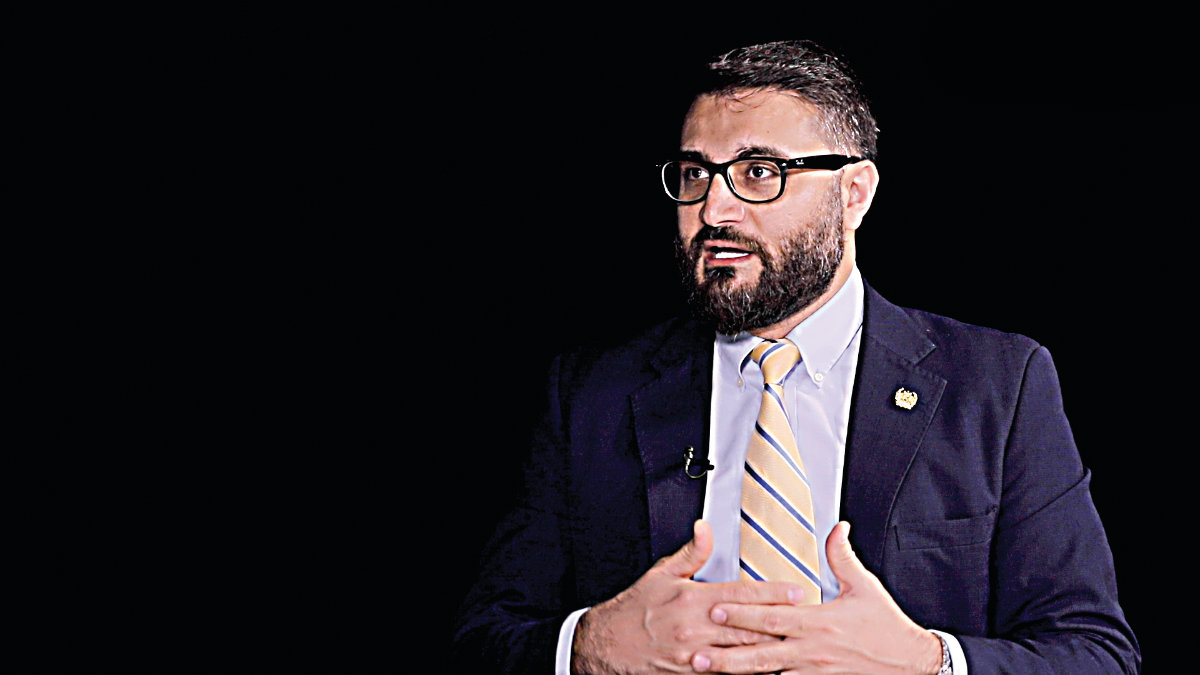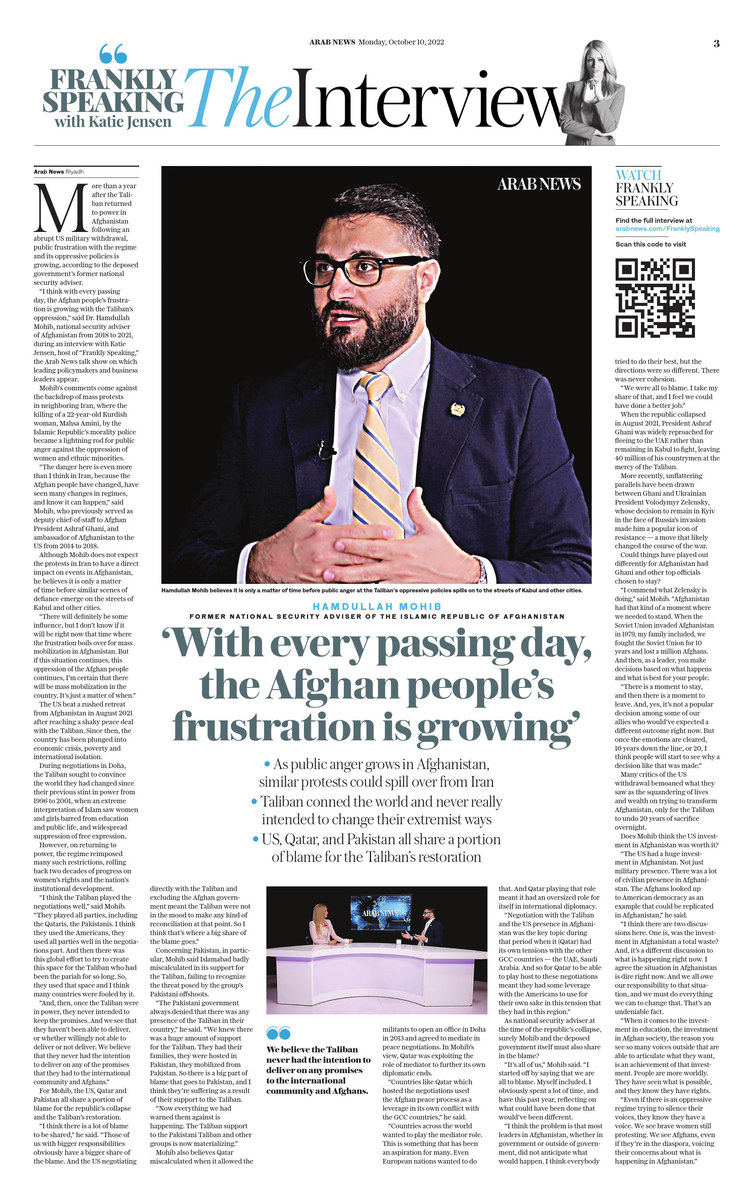RIYADH: More than a year after the Taliban returned to power in Afghanistan following an abrupt US military withdrawal, public frustration with the regime and its oppressive policies is growing, according to the deposed government’s former national security adviser.
“I think with every passing day, the Afghan people’s frustration is growing with the Taliban’s oppression,” said Dr. Hamdullah Mohib, national security adviser of Afghanistan from 2018 to 2021, during an interview with Katie Jensen, host of “Frankly Speaking,” the Arab News talk show on which leading policymakers and business leaders appear.

Dr. Hamdullah Mohib served as national security adviser of Afghanistan from 2018 to 2021. (AN photo)
Mohib’s comments come against the backdrop of mass protests in neighboring Iran, where the killing of a 22-year-old Kurdish woman, Mahsa Amini, by the Islamic Republic’s morality police became a lightning rod for public anger against the oppression of women and ethnic minorities.
“The danger here is even more than I think in Iran, because the Afghan people have changed, have seen many changes in regimes, and know it can happen,” said Mohib, who previously served as deputy chief-of-staff to Afghan President Ashraf Ghani, and ambassador of Afghanistan to the US from 2014 to 2018.
Although Mohib does not expect the protests in Iran to have a direct impact on events in Afghanistan, he believes it is only a matter of time before similar scenes of defiance emerge on the streets of Kabul and other cities.
“There will definitely be some influence, but I don’t know if it will be right now that time where the frustration boils over for mass mobilization in Afghanistan. But if this situation continues, this oppression of the Afghan people continues, I’m certain that there will be mass mobilization in the country. It’s just a matter of when it will be.”
The US beat a rushed retreat from Afghanistan in August 2021 after reaching a shaky peace deal with the Taliban. Since then, the country has been plunged into economic crisis, poverty and international isolation.
During negotiations in Doha, the Taliban sought to convince the world they had changed since their previous stint in power from 1996 to 2001, when an extreme interpretation of Islam saw women and girls barred from education and public life, and widespread suppression of free expression.
However, on returning to power, the regime reimposed many such restrictions, rolling back two decades of progress on women’s rights and the nation’s institutional development.
“I think the Taliban played the negotiations well,” said Mohib. “They played all parties, including the Qataris, the Pakistanis. I think they used the Americans, they used all parties well in the negotiations part. And then there was this global effort to try to create this space for the Taliban who had been the pariah for so long. So, they used that space and I think many countries were fooled by it.
“And, then, once the Taliban were in power, they never intended to keep the promises. And we see that they haven’t been able to deliver, or whether willingly not able to deliver or not deliver. We believe that they never had the intention to deliver on any of the promises that they had to the international community and Afghans.”
For Mohib, the US, Qatar and Pakistan all share a portion of blame for the republic’s collapse and the Taliban’s restoration.
“I think there is a lot of blame to be shared,” he said. “Those of us with bigger responsibilities obviously have a bigger share of the blame. And the US negotiating directly with the Taliban and excluding the Afghan government meant the Taliban were not in the mood to make any kind of reconciliation at that point. So I think that’s where a big share of the blame goes.”
Concerning Pakistan, in particular, Mohib said Islamabad badly miscalculated in its support for the Taliban, failing to recognize the threat posed by the group’s Pakistani offshoots.
“The Pakistani government always denied that there was any presence of the Taliban in their country,” he said. “We knew there was a huge amount of support for the Taliban. They had their families, they were hosted in Pakistan, they mobilized from Pakistan. So there is a big part of blame that goes to Pakistan, and I think they’re suffering as a result of their support to the Taliban.
“Now everything we had warned them against is happening. The Taliban support to the Pakistani Taliban and other groups is now materializing as we had anticipated.”
Mohib also believes Qatar miscalculated when it allowed the militants to open an office in Doha in 2013 and agreed to mediate in peace negotiations. In Mohib’s view, Qatar was exploiting the role of mediator to further its own diplomatic ends.
“Countries like Qatar which hosted the negotiations used the Afghan peace process as a leverage in its own conflict with the GCC countries,” he said.
“Countries across the world wanted to play the mediator role. This is something that has been an aspiration for many. Even European nations wanted to do that. And Qatar playing that role meant it had an oversized role for itself in international diplomacy.
“Negotiation with the Taliban and the US presence in Afghanistan was the key topic during that period when it (Qatar) had its own tensions with the other GCC countries — the UAE, Saudi Arabia. And so for Qatar to be able to play host to these negotiations meant they had some leverage with the Americans to use for their own sake in this tension that they had in this region.”
As national security adviser at the time of the republic’s collapse, surely Mohib and the deposed government itself must also share in the blame?
“It’s all of us,” Mohib said. “I started off by saying that we are all to blame. Myself included. I obviously spent a lot of time, and have this past year, reflecting on what could have been done that would’ve been different.
“I think the problem is that most leaders in Afghanistan, whether in government or outside of government, did not anticipate what would happen. I think everybody tried to do their best, but the directions were so different. There was never cohesion.
“We were all to blame. I take my share of that, and I feel we could have done a better job. Could we have prevented the Taliban takeover? I still believe we couldn’t have once the negotiations began, and the decision by the chief negotiator was to engage the Taliban directly behind the government’s back and have secret annexes in the negotiations that the government and the Afghan people are still not aware of. And once that was, the Taliban had more leverage than the Afghan government did.”
When the republic collapsed in August 2021, President Ashraf Ghani was widely reproached for fleeing to the UAE rather than remaining in Kabul to fight, leaving 40 million of his countrymen at the mercy of the Taliban.
More recently, unflattering parallels have been drawn between Ghani and Ukrainian President Volodymyr Zelensky, whose decision to remain in Kyiv in the face of Russia’s invasion made him a popular icon of resistance — a move that likely changed the course of the war.
Could things have played out differently for Afghanistan had Ghani and other top officials chosen to stay?
“I commend what Zelensky is doing,” said Mohib. “Afghanistan had that kind of a moment where we needed to stand. When the Soviet Union invaded Afghanistan in 1979, my family included, we fought the Soviet Union for 10 years and lost a million Afghans as a result. And then, as a leader, you make decisions based on what happens and what is best for your people.
“There is a moment to stay, and then there is a moment to leave. And, yes, it’s not a popular decision among some of our allies who would’ve expected a different outcome right now. But once the emotions are cleared, 10 years down the line, or 20, when people can reflect back without emotions included, I think people will start to see why a decision like that was made.”
Many critics of the US withdrawal bemoaned what they saw as the squandering of lives and wealth on trying to transform Afghanistan, only for the Taliban to undo 20 years of sacrifice overnight.
Does Mohib think the US investment in Afghanistan was worth it?
“The US had a huge investment in Afghanistan. Not just military presence. There was a lot of civilian presence in Afghanistan. The Afghans looked up to American democracy as an example that could be replicated in Afghanistan,” he said.
“I think there are two discussions here. One is, was the investment in Afghanistan a total waste? And, it’s a different discussion to what is happening right now. I agree the situation in Afghanistan is dire right now. And we all owe our responsibility to that situation, and we must do everything we can to change that. That’s an undeniable fact.
“When it comes to the investment in education, the investment in Afghan society, the reason you see so many voices outside that are able to articulate what they want, is an achievement of that investment. People are more worldly. They have seen what is possible, and they know they have rights.
“Even if there is an oppressive regime trying to silence their voices, they know they have a voice. We see brave women still protesting. We see Afghans, even if they’re in the diaspora, voicing their concerns about what is happening in Afghanistan.”


























